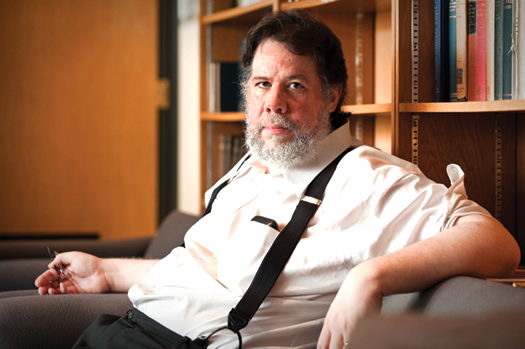A deep voice bellowed from the podium, “For this first piece, I would like to take you all to the island of Puerto Rico,” said Martín Espada.
As part of Latino American Heritage Month, the DU Latino Center for Community Engagement and Scholarship (DULCCES) presented a reading by poet, Martín Espada, on Thursday at 7 p.m. in the Driscoll Ballroom.
The reading, which lasted about an hour and a half, was composed of Espada reciting 13 poems picked from a variety of his published works and a question and answer portion, with a dessert reception following.
Espada recited his poems with passion, one leg frequently shaking and kicking with energy, as his hands and arms would fly around the vicinity of his head with vigor. He also explained the inspirations or social context behind each piece with anecdotes or dry humor.
Espada is of Puerto Rican descent but originally born in Brooklyn, New York. His father, Frank Espada, whom he noted is a major influence, was one of the leaders of the Puerto Rican community and civil rights movement in Brooklyn.
Espada has published more than 15 books as a poet, editor, essayist and translator. Some prevalent themes that Espada’s works center upon are Latino culture, civil rights and the plights of disadvantaged peoples and immigrants.
He worked for some time as a tenant lawyer in Massachusetts where he said he would often be inspired to write by witnessing the many immigrant cases he dealt with.
“I had the body of a lawyer but the head of a poet,” said Espada.
Many of Espada’s poems are dedicated to people whom he has known, been influenced by or are in commemoration of, such as with the last piece he recited called Albanza: In Praise of the Local 100. The byline of the poem reads, “For the 43 members of Hotel Employees and Restaurant Employees Local 100, working at the Windows on the World restaurant, who lost their lives in the attack on the World Trade Center.”
Many of his other pieces are also written in honor of people who never had the chance to speak for themselves and be heard. Espada noted that giving them a voice was one of his major duties as a Latin-American poet.
He also criticized the manner in which society seems to white-wash the past.
“If we lie to ourselves about history, we will lie to ourselves about everything else,” said Espada.
According to the DULCCES website, Latino American Heritage Month is celebrated across the country from Sept. 15 – Oct. 15. This period of time was selected because it represents the anniversary of the independence of seven Latin American countries.
At DU, Latino Heritage Month is celebrated during the month of October to accommodate the academic year. The political, cultural and historical legacies of Latino communities are honored with a number of activities across the campus and in the community.
The arts play a large role in the celebration, with special activities including dance performances, musical concerts, culinary events hosted by various cultural groups on campus and academic discussions about relevant community issues, such as affirmative action and the legal system.
Past celebrations have featured renowned Latino authors sharing their life experiences and creative works. Espada visited DU and spoke during the 2010 celebration as well.
Espada’s reading highlighted for some attendees issues they had previously not considered.
“He was really interesting. He made me realize there are a lot more under-represented people than I actually expected,” said freshman Cecilia Morales from Santa Ana, Calif.
Many students from various different Spanish classes at DU were present at the reading. Senior Madeline Nash, a Spanish major from Chicago, Ill. remarked about the value of these types of cultural events.
“It is always great as a student to attend these because I’m reminded of the failures and successes throughout history. Literature is a beautiful way to represent our history that is more than just words in a textbook,” said Nash.
To learn more about Espada’s work visit his website at [www.martinespada.net]. And to find out what else is happening for DU’s Latino American Heritage Month check out their calendar at: bit.ly/1e4LKMu.











